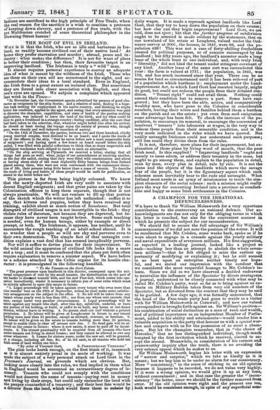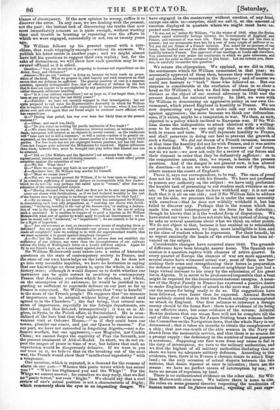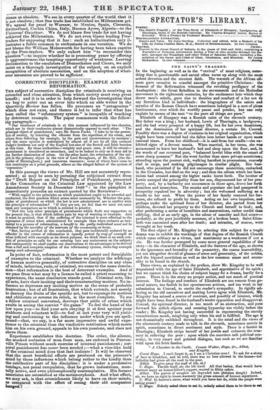A CHAMPION FOR THE IRRATIONAL DEFENCELESSNESS.
WE have to thank Sir William Molesworth for a very opportune contribution to the controversy on national defence. Our ac- knowledgments are due not only for the obliging terms in which his letter is couched, but also for the convenient manner in which he presents the subject for our reconsideration. We should fail to secure the full advantage of Sir William's communication if we did not note the position of the writer. It will be recollected that Mr. Cobden, some weeks back, spoke as if he were about to engage in a crusade against the yearly military and naval expenditure of seventeen millions. His first suggestion, as reported in a leading journal, looked like a project so rash—nothing less than an attempt to abolish the whole seven- teen millions !—that he felt obliged to seize the earliest op- portunity of modifying or explaining it.; but he still seemed to us bent upon an enterprise neither timely nor hope- ful, and we stated our impression with the candour that we considered the most respectful homage to Mr. Cobden's ta- lents. Since we did so we have observed a decided endeavour to neutralize the influence of the Spectator by divers stratagems. A journal, understood to be closely connected with what may be called Mr. Cobden's party, went so far as to bring against us ex- tracts on Military Reform taken from very old numbers of the Spectator, but so divorced from the context that they may be said to be garbled. A few days ago, it was formally announced, that the head of the Free-trade party had gone to reside as a visiter with Sir William Molesworth in Cornwall; and now our valued correspondent is brought forth against us. Sir William's position— his combination of social distinction as a man of rank and wealth, and of political importance as an independent Member of Parlia- ment, added to his ability and attainments—would render him a valuable acquisition to the party that honour us with a special war- fare and compete with us for the possession of so stout a cham- pion. But let the champion remember, that in "the choice of Hercules," that no less distinguished individual, though much tempted by the first invitation which he received, elected to ac- cept the second. Meanwhile, in consideration of his earnest and praiseworthy inquiry after the truth, there is no avoiding the very solemn appeal which he makes to us. Sir William Molesworth begins his letter with an expression of " sorrow and surprise," which we take as kindly as it is meant; but we beg him to be under no alarm for our consistency. Mere " consistency," in the sense of sticking to an old opinion because it happens to be recorded, we do not value very highly. If it were a wrong opinion, we would give it up at any time, without concealment ; and in that case the greater the " incon- sistency" the better, since we should be the further removed from error. If the old opinion were right and the present one too, both would be consistent enough, in spite of any superficial sem- blance of discrepancy. If the new opinion be wrong, suffice it to discover the error. In any case, we are dealing with the present, not the past : the instant task of discovering the truths that now most immediately concern us is quite enough, without wasting time and trouble in boasting or repenting over the efforts in which we were engaged, successfully or not, ten or twenty years ago- Sir William follows up his general appeal with a cate- chism, that reads trippingly enough—without its answers. We publish his letter entire in another page ; and we might almost have left his questions to suggest their own replies; but, for the sake of distinctness, we will showhow each question may be an- swered offhand as it is asked. Question—u Can you be serious in proposing to increase our expenditure on the Army, Navy, and Ordnance?" Anatoer—We are not "serious" in doing so, because we have made no propo- sition of the kind. What we propose is, such inquiry and such measures as shall secure that our defences be sufficient. The general question of cost is a separate question, specially distinguished from that of efficiency of defence by the fact that it does not require to be accomplished by any particular juncture of time, but rather demands deliberate handling.
Q.—" Is it [our military expenditure) not as large as, if not larger than, it has been at any period during the last thirty years ? "
A..--Possibly: we have not recently engaged in that investigation; but are quite prew,W to call upon the Representative Assembly in which Sir William sits to explain why it has suffered the expenditure to increase, when it has been shown over and over again that our forces might be rendered more efficient with km expenditure.
cl.—" Daring that period, has war ever been less likely than at the present moment?"
A.—Often; and much less likely..
Q.—" Do you count as nothing the pacific tendencies of free trade?" A.—We count them as much. Commerce, between nations, as between indivi- duals, interposes self-interest as an obstacle to mortal contest: as the tradesman will " take care not to kill a customer," so will a nation—unless it be greatly ex- asperated,or the disaster occur in the chance-medley of a riot brought on by third parties. For free trade has not yet expunged human passions, nor has the Anti- Corn-law League quite achieved the Millennium for mankind. Higher influences than trade, however free, must be brought into play before that blessed lora can be attained.
Q.—" Did we [Sir William and the Spectator] not advocate free trade as a great social, international, and civilising measure which would afford potent
securities against the calamities of war?" A.—We did. What then?
4—" Have we no longer any faith in our principles?"
A.—Spectator has; Sir William may answer for himself. 4—" Must we recant then ? "
A.—Not we: we cannot prevent Sir William, if he be bent upon Bo doing; and if he considers sufficiency of national defence as incompatible with free trade— which we do not—he may perhaps feel called upon to recant," after due con- sideration of the nninvestigated subject.
Q.—" Having obtained free trade, shall our first act be to arm our peoples and cover our shores with fortifications, as if we had declared hostility to the rest of the human race by proposing to exchange our manufactures for their food?'
A.—By no means. We do not know that anybody has anticipated Sir William in enunciating such very silly propositions as "covering our shores with fortifi- cations," "declaring hostility to the rest of the human race," or making a declara- tion of war in the shape of a proposition to trade. What is the use of asking each a question? It is needless to inquire of so good a logician as Sir William Molesworth what sort of epithet he would apply to such an interrogatory: we be- lieve be would call it " irreevant," or " impertinent "; we are content to let it pass for a flight of hyperbole. Q.—" Are our revenues so vast, so excessive—our means of employing them so deficient ? Are our people so well educated—oar prisons so excellent—our rail- roads all completed? have we nothing to do with our superabundant wealth, that we must squander it to guard against imaginary dangers?" A.—No: but the badness of our education or prisons does not establish the sufficiency of our defence any more than the incompleteness of our railways refutes the Duke of Wellington's letter on a totally different subject. Again we fly to our friend's logic, as to a sanctuary against such questions. Sir William Molesworth next enters into a series of historical questions on the state of contemporary society in France, and the state of our own knowledge on the subject. As he does not go into very recondite inquiries, we have no hesitation in saying that our knowledge on those points is, upon the whole, in a satis- factory state ; although it would dispose us to doubt whether our instructor can be quite correct in ascribing to contemporary France that Arcadian condition which he sketches, and which, on the assumption of its existence, be would be justified in re- ding as sufficient to supersede defence on our part so far as France is concerned. Sir William believes that "war is hateful" to the mass of the French people! He supposes that "no measure of importance can be adopted without being first debated and agreed to in the Chambers "; the fact being, that several mea- sures of importance especially in the foreign departments, are first taken, and then debated, retrospectively : it was so in Al- giers, in Syria, in the Polish affair, in Switzerland. He is scan- dalized at the bare hint that they might possibly make an incon- venient visit at Osborne House,—" as if they could burn our towns, plunder our coasts, and put our Queen to ransom." For our part, we have not succeeded in forgetting Algeria,—not a de- fensive warfare, but one aggressive,—nor Mogador' nor Cochin China; we cannot forget the captivity of Pius the Seventh, nor the present treatment of Abd-el-Bader. In short, we do not ex- pect the usages of peace in time of war, but believe that such an expectation would be dangerously delusive. If we were to put our trust in it, we believe that on the breaking out of the next war, the French would show their "intellectual superiority "with a vengeance. One question, which is repeated, is a demand for the reasons of alarm on our part—" Whence this panic terror which has seized yen?" "What has frightened you and the Whigs?" For the Whigs we cannot answer ; for ourselves we may reply, that we feel no" panic terror," nor even "fright." We should say that a cool review of one's actual position is not a characteristic of fright; villa& commonly ahem the eyes to an impending danger. We have engaged in the controversy without emotion of any kind, except one akin to—surprise, shall we call it, at the amount of emotion displayed in quarters where we might most have ex- pected cool reason. "It was not so," writes Sir William, " in the winter of 184.0, when the Syrian dispute raised unfriendly feelings between the Governments of England and France, and rumours of war were rife. Then the danger was not less than at present; but our armaments were less by a cost of some couple of millions or so. Yet you did not dream of a French invasion. You asked for no increase of our forces, but backed me and the other friends of peace in denouncing feelings of hostility towards France. You approved of our meetings at Leeds and elsewhere. You sanctioned by your praise the sentiments to which we gave utterance, and which are the same as those contained in this letter. Let ins entreat you, them- fore, to carefully reconsider this question."
We return the objurgation. We applaud, as we did in 1840, the sentiments which Sir William enunciated in that year: we necessarily approved of them then because they were the identi- cal opinions already recorded in the Spectator ; and of course we could not hesitate to " back " those who followed us. But our surprise is considerable at the confusion of ideas in so clear a head as Sir William's, when we find him confounding things so distinct as the object of our mutual advocacy in 1840 and the present demand for national security. In 1840, we were with Sir William in denouncing an aggressive policy in our own Go- vernment, which placed England in hostility to France. We are now deprecating any neglect to make safe our own defences against aggression ; the more because we think our defenceless- ness, if it exists, might be a temptation to war. We then, as now, objected to a policy which inclined to European war. If Sir Wil- ham deems the indisposition to attack identical with a willing- ness to be attacked, we can only say that we differ with him both in reason and taste. We still deprecate hostility to France and shall persevere in doing our best to prevent the growth such a feeling. We did not dream of a French invasion, because at that time the hostility did not lie with France, and it was active in a distant field. We asked then for no increase of our forces, nor do we now—we now ask only for a review of our forces and their disposal in order that they be defensively sufficient : as to the comparative amount, that, we repeat, is beside the present question. And if the danger is not greater now, it has altered its direction—it is not we who menace the coasts of Syria, but others menace the coasts of England. Prove it, says our correspondent, to be reaL The onus of proof does not lie with us, but with his friends. We have not professed to possess any authority on the subject : we have only performed the humble task of presenting to our readers such evidence as ex- ists. We are not aware that we have withheld any : it is not our fault that it is all on one side ; and if Sir William fails to adduce any on his side, we presume that he is under the same necessity with ourselves—that he does not wilfully withhold it, but has failed to discover any. Perhaps that is the reason which has made him select interrogatory as the form for his dialectics ;. though he knows that it is the weakest form of disputation. We have stated our views : he does not state his, but instead of doing so, he asks us several questions about what we think on other points. We do not object to that, because it has enabled us to ridstattlish our position, in a manner, we hope, more intelligible to him sad to the class of readers whom he represents. For their benefit, let us repeat succinctly the heads of the evidence that Jaas been ad- vanced on the subject. Considerable changes have occurred since 1840. The grounds of difference have been brought nearer home. The Spanish suc- cession is a question replete with chances of active quarrel. In every quarter of Europe the chances of war are more apparent.; several states have witnessed actual war ; most of them are bur- nishing their arms and strengthening their forces in preparation for defence or aggression. Our nearest neighbour has just had a large virtual increase to his army by the submission of his great foe in Algeria. It is never to be pronounced impossible that a vent might be required for the inconvenientnational energies. A mem- ber of the Royal Family in France has expressed a positive desire to make England the object of attack in the next war. He pointed out the means for being ready to do Bo. His suggestions have been followed, even faster than he expected. Admiral Bowles has publicly stated that in 1844 the French actually contemplated an attack on England. Our first reliance to intercept a foreign enemy should be the home fleet : there is no evidence of its being in an effective state, but some evidence of the reverse. Admiral Bowles declares that our steam fleet will not be complete till the end of this year: Captain Sir James Stirling bears witness before the Committee on the Navigation-laws, that the whole Navy is un- dermanned; that it takes six months to obtain the complement of a ship ; that not one-tenth of the able seamen in the Navy are drawn from the mercantile service, and that there is no source for a prompt supply : the deficiency in the number of trained gunners is notorious. Supposing our fleet were from any cause to fail in the duty of interception, we turn to the military authorities, and we find the highest of all military authorities declaring that on shore we have no adequate military defences. According to this evidence, then, there is in France a chronic desire to attack Eng- land; on the only occasion of actual dispute between the two nations, that desire ripened at once to intention ; there are the means : we have no perfect means of interception by sea.; tve have no means of repulsion by land. There is no authenticated evidence on the other side. Sir Wil- liam Molesworth cites none. We believe there is none to cite_. He relies on some general theories respecting the tendencies of human nature and. its jiiture conduct; rejecting all past eve- . rience as obsolete. We see in every quarter of the world that it is not obsolete ; that free trade has established no Millennium yet. We appeal for proof to Warsaw, to Mexico, Spain, Circassia, Switzerland, Cochin China, Italy, Buenos Ayres, Algeria—to the Universal Gazetteer. We do not blame free trade for not having achieved the Millennium. We do not even blame leading Free- traders for supposing that it has : such an hallucination only il- lustrates a foible common to enthusiasts in one vocation. We do not blame Sir William Molesworth for having been taken captive by the Free-traders. We only exhort him 'to reconsider this question "—to inquire whether he is promoting peace by offering to aggressiveness the tempting opportunity of weakness. Leaving declamation to the emulators of Demosthenes and Cicero, we only insist on a thorough investigation of the subject, on an explicit recognition of absolute necessities, and on the adoption of what- ever measures are proved to be sufficient.




























 Previous page
Previous page